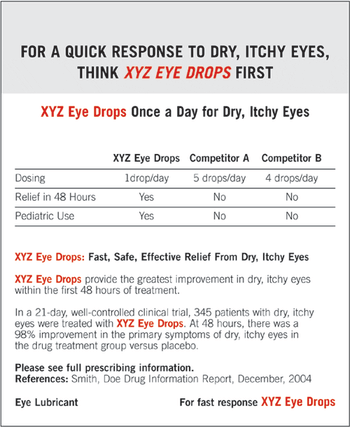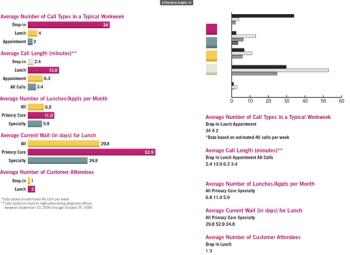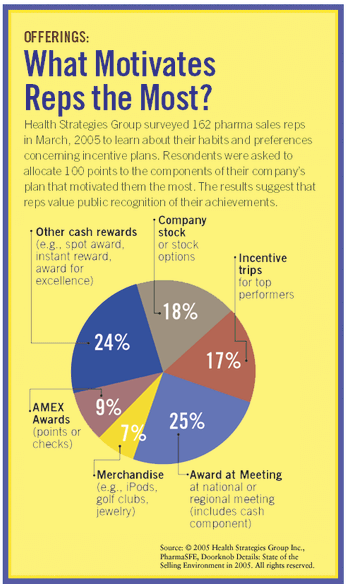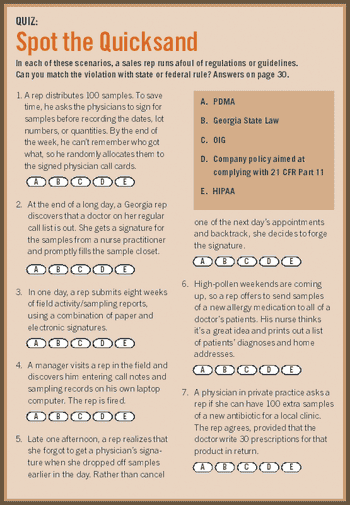
Pharmaceutical Executive
A review of the best ads of 2004--and the people that created them.

Pharmaceutical Executive
A review of the best ads of 2004--and the people that created them.

Pharmaceutical Executive
The future of US healthcare is being created today in Medicare's demonstration programs. But how you respond to them depends a lot on what kind of company you are.

Pharmaceutical Executive
A recently released report claims pharma hides bad clinical trial results and over-promotes drugs. Tougher regs are being called for.

Pharmaceutical Executive
Just a decade ago, FDA was accused of dragging its feet on new drug applications. Now, supposedly, the agency is moving so fast that it's letting unsafe, insufficiently tested products into the marketplace.

Pharmaceutical Executive
Our goal is competency-based training that has a solid business need, sound instructional design based on adult-learning principles, and metrics that can capture, evaluate, and track what we do. We want a blended-learning approach that can be delivered over the Web, on CD-ROM, or on paper.

Pharmaceutical Executive
Some reps take to tablet PCs like ducks to water, while others wait for them to become the gold standard. Good training can put everyone on the same page.

Pharmaceutical Executive
I realized that, as president of a pharmaceutical company, I am now a representative of the entire industry. As such, my toughest challenge is listening to and seeing the kind of scrutiny our industry is taking.

Pharmaceutical Executive
"You're fired!" It's a simple phrase that everyone is using, and it's put Donald Trump back into the spotlight. However, the most important statement you will ever make as a manager is "you're hired." With all the pressures of the job and the limited time you have for interviewing, it is easy to rush through this process to fill a slot. Stop yourself-hiring a good person is one of the most important decisions you will make as a manager.


Pharmaceutical Executive
The sales aid or detail piece tells the features and benefits about the product. The important marketing points are in bold print.

Pharmaceutical Executive
It's twelve o'clock-do you know where your reps are? According to research from Health Strategies Group, lunches provide one of the few opportunities in today's short-call environment for sit-down discussions with doctors. The average length of a lunch is 13 minutes, with an average of three physicians per meeting.

Pharmaceutical Executive
A new TV doctor show features the most loathsome pharmaceutical executive in recent memory. But in another important way, the show is serving pharma's best interests.

Pharmaceutical Executive
Employees are most attracted to products they might feel guilty about buying for themselves, but when they have points to redeem, they feel fine about splurging.


Pharmaceutical Executive
If you work for a company that isn't interested in increasing sales across your portfolio, don't read this article. Otherwise, you'll learn that your district managers (DM) are the keys to doing just that. DMs select and hire new sales reps, guide product knowledge, develop selling skills, provide feedback, and take action to turn around or terminate poor performers. The average industry DM is responsible for generating tens of millions of dollars in sales through his or her teams. But, only 45 percent of industry DMs achieve their sales goals. Companies that succeed in raising the overall effectiveness of their DMs will create sustainable competitive advantage.

Pharmaceutical Executive
Post-approval studies, at many companies, do not have a consistent strategy that builds networks of investigators.

Pharmaceutical Executive
In a non-human primate study, high doses of Neumune resulted in 90 percent survival against a lethal level of radiation.

Pharmaceutical Executive
OIG now requires corporate marketing departments and field sales reps to not only document how they promote products, but to also-for the first time-demonstrate the "intent" of marketing activities.

Pharmaceutical Executive
Direct-to-consumer spending increased from $3.2 billion to almost $4.1 billion between 2003 and 2004, the biggest leap since the category began in 1997. While other US industries are just getting their footing back after a prolonged economic slump, DTC advertising, as in previous years, seems unaffected and continues to thrive. Even in the wake of FDA's virtual shutdown of the lucrative COX-2 inhibitor market, both DTC and professional promotional spending have, so far, remained in tact. (See "TV Dominates")

Pharmaceutical Executive
When translating English materials into other languages, be careful of words that mean one thing in one dialect and something else in another dialect. Otherwise, you run the risk of referring to coaches as animal trainers.